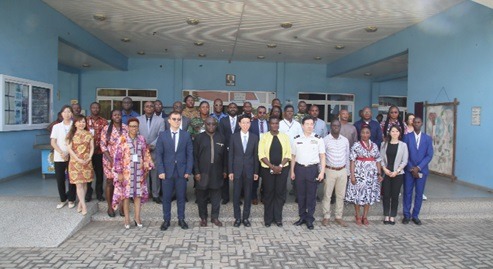The West African sub-region requires a robust action to deal with terrorism, with the Sahel region now considered the epicentre of global terrorism.
The Commandant of the Kofi Annan International Peacekeeping Training Centre (KAIPTC), Major General Richard Addo Gyane, has, consequently, underscored the urgent collaborative regional efforts to address the root causes and consequences of violent extremism and terrorism.
The Commandant made the call at the opening of a two-week training in Accra on preventing violent extremism, radicalisation, and small arms proliferation in the Sahel and adjoining coastal states in West Africa.
The training is led by the KAIPTC, in partnership with the Government of Japan and the United Nations Development Programme.
It is to enhance knowledge and foster information-sharing among security personnel and civil society actors in the fight against terrorism, violent extremism, and the proliferation of small arms in seven West African nations: Benin, Togo, Ghana, Cote d’Ivoire, Niger, Mali, and Burkina Faso.
Major General Gyane, in a speech read on his behalf by the Director, Faculty of Academic Affairs and Research, KAIPTC, Professor Kwesi Aning, indicated that statistics from the 2023 Global Terrorism Index provided a sobering assessment of the current state of affairs in the Sahel region which revealed a disturbing trend that demanded immediate attention and concerted efforts.
Surge
He said from 2007 to 2023, there had been an alarming surge in terrorist activities in the Sahel and that in 2007, the region accounted for just one per cent of the global death toll due to terrorism.
“However, by 2023, this figure had skyrocketed to a staggering 43 per cent.
This exponential increase is nothing short of a crisis, as the Sahel has now become the epicentre of global terrorism,” he indicated.
The shift in the epicentre of terrorism, he said, was particularly striking when historical hotspots were considered.
Major General Gyane said the Middle East and Maghreb, which were long associated with significant terrorist activity, had been surpassed by the Sahel.
“This means that the Sahel region now experiences a higher concentration of terrorist incidents and resulting casualties.
One of the most concerning aspects is the spreading footprint of violent extremism,” he said.
He said Burkina Faso, in particular, has seen a significant increase in attacks, with 58 per cent of all incidents in the Sahel occurring within its borders and that the expansion of violence from its origins in Mali to neighbouring countries painted a grim picture of the challenges the region faced.
“The ripple effect has reached littoral countries, including Cote d’Ivoire, Benin, and Togo.
As the violence spreads, there are growing concerns about its potential further expansion into Ghana”.
Initiative
The Commandant expressed optimism about the capacity building course which would enhance knowledge and awareness of initiatives like the Accra Initiative, and facilitate information sharing among security personnel, stockpile managers, and armourers.
“The course further aims to boost local efforts to enhance security, and empower civil society in the fight against terrorism, violent extremism, and the proliferation of small arms”.
KAIPTC, as one of the three ECOWAS centres of excellence, he said remained committed to providing globally recognised capacity-building for all stakeholders in African peace and security through training, education, research, and policy dialogues, ultimately contributing to peace and stability in Africa.
The UNDP Deputy Resident Representative, Sukhrob Khoshmukhamedov, said the devastating attacks on citizens and communities in Mali, Niger and Burkina Faso in recent years were hitting the most vulnerable hardest.
Border
Border communities and young people, who were denied access to education or gainful employment, remain vulnerable to radicalisation to violent extremism.
In the absence of an integrated and robust response, he said there was a pending humanitarian crisis in the sub-region.
“We must continue to enhance national capacities and cross-border in formation sharing to anticipate and prepare to counter these threats in order to protect lives and advance development”.
He said it was, therefore, timely that UNDP and the Government of Japan, through the KAIPTC, were supporting efforts to prevent further escalation of violent extremists’ activities and the uncontrolled proliferation of arms in our countries.




